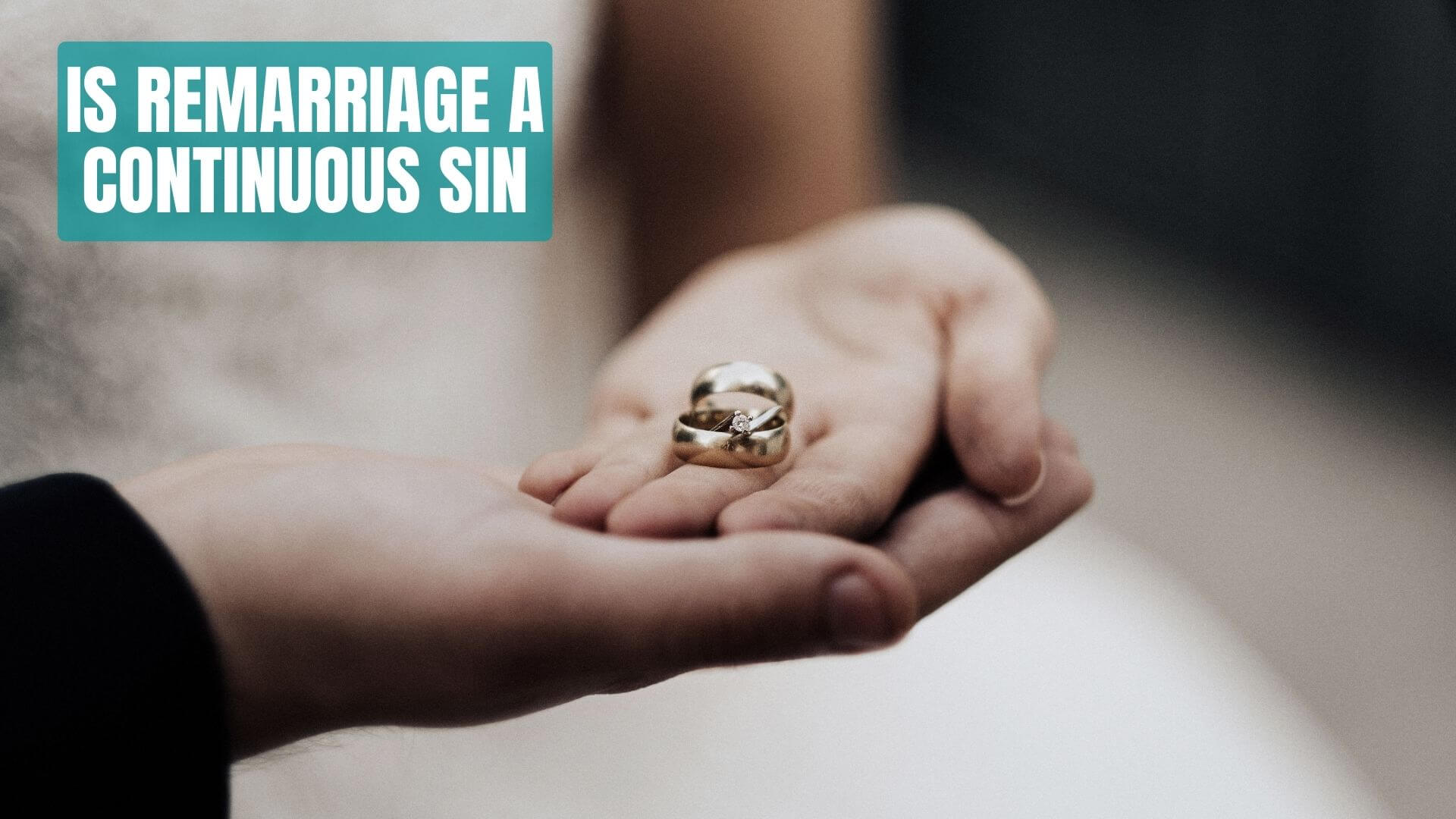According to Jesus, remarriage after divorce is adultery. This can sound very harsh for those who have been divorced and have remarried. However, Christ does not ask us to follow him just because it is the easiest thing to do or what “feels” right in our human nature.
We all must understand that Christ expects a great deal from his disciples and that obedience is required for salvation. Remarrying after divorce does not allow anyone who so chooses to avoid the holiness that God desires for his followers.
So, is remarriage a continuous sin?
A person remarried after divorce or entered into a second marriage without obtaining an annulment of their previous union is living in adultery. According to Jesus, remarriage after divorce and while the ex-spouse is still alive is an act of adultery. In Matthew 19, Jesus says:
And I say to you: whoever divorces his wife, except for sexual immorality, and marries another, commits adultery.”
Note that Jesus never said that remarrying after a divorce was adultery (i.e., remarriage is a continuous act of adultery). Instead, Jesus declared that anyone who remarries after a divorce commits adultery (i.e., the person’s decision to remarry was sinful). Jesus states that the man “marries” another woman. If this new union didn’t have God’s blessing, Jesus would not have considered it a marriage.
This indicates that the new marriage is a legal union-made by exchanging vows and completed in a “one-flesh” relationship. Although this lawful commitment was formed through adultery, it must be acknowledged and honored as any other marriage.
Even if the marriage begins with an act of adultery, God sees every marital covenant as sacred. A second marriage is a sin against the first, but the previous marriage’s existence does not make the second marriage unlawful. Even if it was founded via adultery, every marriage is a commitment that must be kept.
When a married couple has sexual relations, they become one flesh in that marriage and break their former vows through adultery. This act is an act of adultery because it violates the early covenant. Once a covenant is broken, it is broken forever. There is no way to “continuously” break a covenant more than once. When a couple remarries and consummates their marriage, we don’t say they commit adultery continuously since they are still married. While the repercussions of adultery last a lifetime, the act itself occurs in a split second, and the sin cannot be “erased” or “corrected” by ending the new marriage. Dissolving the new union would worsen the earlier sin because divorce is always a sin.
Therefore, the answer “Is remarriage a continuous sin ?” is NO. Therefore, remarriage is not a continuous sin.
Why is remarriage considered a continuous sin?
The Catholic Church teaches that it is. However, it does not lead that every remarriage being automatically invalid. The reason for this is that there are two kinds of marriages. One kind is sacramental marriage, and the other is a natural marriage.
A sacramental marriage cannot be dissolved by death or divorce because God has blessed it. On the other hand, a natural marriage can be dissolved by death or divorce because it was not blessed by God in the first place but rather contracted between two people who did not intend to enter into a lifelong union with each other.
The question then arises: If a natural marriage was contracted without entering into a lifelong union with another person, what happens when one of the parties dies or gets divorced? In this instance, there are two possibilities:
- If they were validly married at all, then they would still be married even though their life together ended due to death or divorce;
- If they were not validly married at all (i.e., if their union never really existed), their relationship ends with death or divorce. Neither party has any rights or obligations toward one another anymore (except possibly for financial obligations).
What is a continuous sin?
A continuous sin is a sin that we repeat over and over again. We continue to engage in a pattern of conduct despite knowing it’s incorrect. It could be a series of acts or even a consistent pattern of behavior that results in the same outcome.
Continuous sin is a pattern of disobedience to God’s instructions that continues throughout time. It is a practice of disobedience rather than a single act of disobedience.
This term is used in the Bible to characterize those who have been born again but continue to sin after being saved by God’s grace. For example, in 1 John 1:6–7, the Bible reads.
If we say, “We have fellowship with Him,” and walk in darkness, we are lying and are not practicing the truth. But if we live in the light as He is in the light, we have fellowship with one another, and the blood of Jesus, His Son, cleanses us from all sin.
Examples of a continuous sin
A continuous sin can be any form of sin; however, here are a few examples:
- Lying
- Stealing
- Inappropriate sexual behavior
- Taking drugs or drinking alcohol
- Gossiping or slandering another person
the difference between marriage and divorce
Marriage and Divorce are two different things. While both have their pros and cons, they differ in many ways.
Marriage is a lifelong commitment between two people who genuinely care about each other and want to spend the rest of their lives together. Marriage is a commitment made by two people to stay together through good and challenging times. Marriage entails making a lifelong commitment to another person, regardless of how well things go.
Divorce is the legal dissolution of a marriage, usually initiated by one or both people involved. The divorce process is conducted in courts and involves legal procedures. Divorce is a definitive decision issued by a court after hearing both spouses’ sides of the story and determining who should get what share of the assets earned during the marriage or any children born from that union.
Is remarriage a continuous sin according to the Bible?
It’s certainly not a continuous sin, as you’re putting it.
“Anyone who divorces his wife and marries another woman commits adultery, and the man who marries a divorced woman commits adultery. Luke 16:18
These Bible verses indicate that remarriage is a continuous sin, for the word “divorces” is present tense. God expressly forbids divorce in the Bible (Malachi 2:16), but nowhere does God expressly forbid remarriage. Jesus implies that the act of remarriage is a form of adultery which is a sin because your spouse is still alive. He is not implying that the union is a state of continuous sin.
According to the Bible, this issue is reflected in the account of Jacob. After being fooled out of marrying Rachel, Jacob continued to pursue Rachel even though he was already married to Leah. Jacob marries Rachel and two other women in the end. These other marriages were all lawful marriages, even though they were made through adultery.
Jacob’s experience indicates that God regards every marital commitment as valid, even if it begins with an act of adultery. Adultery led the marriage to start because it was a breach of a previous vow; remarriage is not a continuous sin.
Remarriage after adultery is adultery in God’s eyes.
Yes, remarriage is both an act and a state of sin if your first spouse is still alive. It is a sin when two individuals engage in sexual contact, but the state of sin that those two people are in does not terminate when their relationship ends. Until they repent and reconcile with God, they will remain sinners.
There are also compelling reasons to believe it is a sinful act. Because it involves an adulterous heart, Jesus taught that remarriage after divorce is a form of adultery.
Remarrying after the death of your spouse is not a sin. However, the sin of adultery violates a marriage vow to the person who remains alive.
A person who has been married for a long time and then loses his spouse may marry again. Because he was not married to any other woman when his wife died, it is not considered adultery if he does this.
For example, by law a married woman is bound to her husband as long as he is alive, but if her husband dies, she is released from the law that binds her to him.
~ Romans 7:2
Is it a sin to remarry again?
is it a sin to remarry again? The Bible does not specifically address whether it is a sin to remarry again.
let’s look at this question from two perspectives;
- If you were married more than once and both of your spouses died, it is not a sin to remarry again because you are no longer bound by the marriage bonds of the previous two unions.
- If you were married more than once and divorced from your spouse, it is a sin to remarry again. This can also be remarriage adultery. In this case, the Bible advises that you remain unmarried.
If the act of remarriage is adultery which is a sin, remarrying again is a sin. But the new marriage in itself is not a sin. This is because God views marriage as a covenant between two people and one man.
Is it a sin to remarry your spouse?
Is it a sin to remarry your spouse? Many couples who have divorced and then wished to remarry have often asked this question. This is an important question and a difficult one to answer.
To the married I give this charge (not I, but the Lord): the wife should not separate from her husband (but if she does, she should remain unmarried or else be reconciled to her husband), and the husband should not divorce his wife. 1 Corinthians 7:10-11 ESV
The above Bible verse encourages divorced couples to get back together because God hates divorce. Another concept is presented in Deuteronomy 24:1-4,
When a man takes a wife and marries her, if then she finds no favor in his eyes because he has found some indecency in her, and he writes her a certificate of divorce and puts it in her hand and sends her out of his house, and she departs out of his house, and if she goes and becomes another man’s wife, and the latter man hates her and writes her a certificate of divorce and puts it in her hand and sends her out of his house, or if the latter man dies, who took her to be his wife, then her former husband, who sent her away, may not take her again to be his wife, after she has been defiled, for that is an abomination before the Lord. And you shall not bring sin upon the land that the Lord your God is giving you for an inheritance.
where the first couple can only remarry if both parties have been single since the divorce. But in Deuteronomy 24:4 and Jeremiah 3:1, both passage says a spouse who has married someone else cannot remarry their first spouse for they have been defiled in the second marriage.
Final thought
To conclude on this topic, if we consider the arguments mentioned earlier, remarriage for the faithful is an issue between them and God. Despite being Christian believers, they may have fallen into sin; however, they are responsible before God to repent and do their best to clean themselves of this sin.
Remarriage is a continuous state of humiliation to God because you are still married to this sinner, contrary to his advice. It is disobedience to the Word of God; therefore, it is a continuous sin until rectified by compliance with God’s specific instructions. Consequently, we reject second marriages, especially after true repentance where the parties have remained unmarried for at least three years.
Kindly drop your thoughts in the comment section.







